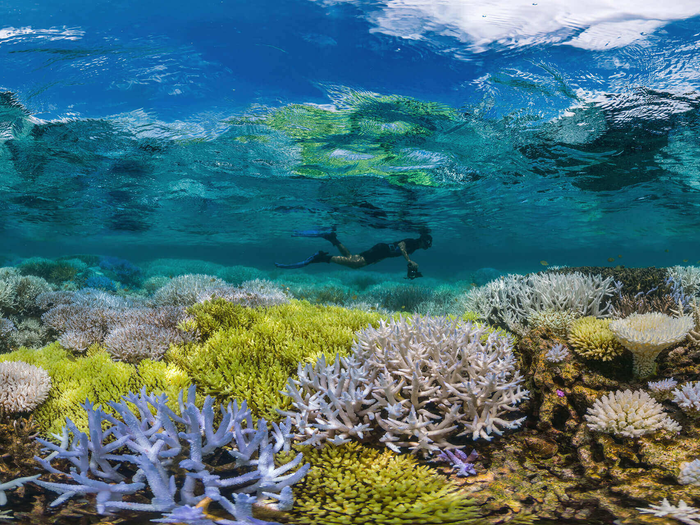Marine heatwaves not simplest have an effect on fish populations immediately by causing adjustments in their metabolism, breeding styles, and distribution, but additionally they have cascading outcomes on the general health of coral reefs. The improved stress on fish populations can cause declines in biodiversity, altered meals webs, and elevated vulnerability to sicknesses. In addition, the bleaching of coral reefs, that could result from prolonged exposure to elevated temperatures, can further reduce the supply of suitable habitats for tropical reef fish. As a result, the ecological and financial cost of those marine ecosystems can be substantially dwindled. Efforts to mitigate the impacts of marine heatwaves on tropical reef fish populations must be prioritized which will hold the fitness and resilience of these treasured marine groups.
Altered Food Availability:
As a end result, reef fish may additionally experience reduced increase rates, decrease reproductive fulfillment, and increased competition for restricted food sources. This can in the end result in declines within the ordinary fitness and variety of reef ecosystems, as well as impacting the critical monetary and ecological offerings they provide. In order to mitigate these outcomes, conservation efforts ought to recognition on protective and restoring the resilience of reef ecosystems in the face of changing environmental conditions due to marine heatwaves. This can also contain implementing sustainable fishing practices, reducing pollutants and habitat destruction, and addressing the foundation causes of climate exchange to prevent future marine heatwave activities. By taking proactive measures to guard reef ecosystems, we can help ensure the ongoing survival and well-being of the numerous marine existence that depends on them.
Migration and Distribution Changes:
Furthermore, modifications in the distribution of tropical reef fish could have cascading consequences on the entire ecosystem. For example, if positive species of fish are pressured to move to special areas, this could disrupt set up predator-prey relationships and impact the general biodiversity of the reef. Additionally, overcrowding in sure regions can put extra strain at the coral reefs and their fragile ecosystems, probably leading to terrible effects which includes coral bleaching and decreased fish populations. Scientists and conservationists must understand tropical reef fish migration and distribution patterns to inform control strategies and conservation efforts. Understanding these changes can help mitigate climate change’s effects on reef populations and ensure ecosystem health and resilience.
Disruption of Reproduction:
These disruptions will have some distance-accomplishing consequences on the overall health of the environment. The loss of sure fish species can cause imbalances in the meals chain, affecting other marine life dependent on those fish for meals. Additionally, a decline in populace numbers can also effect the resilience of the reef machine as a whole, as fish play a important function in retaining the fitness and biodiversity of coral reefs. Furthermore, disruptions in reproduction also can impact the cultural and monetary significance of reef fish to coastal groups who rely upon these species for meals and livelihoods. The loss of key fish species can have ripple consequences on neighborhood economies that depend upon fishing and tourism associated with reef ecosystems. To ensure coral reefs’ long-term health and sustainability, conservation measures like marine inclusion, sustainable fishing practices, and reduced greenhouse gas emissions are crucial for protecting and restoring reef fish reproductive capabilities.
Habitat Degradation:
As corals struggle to get over bleaching occasions, their physical structure weakens, leaving reef fish vulnerable to predators and lowering general biodiversity. Additionally, coral bleaching can disrupt the delicate stability of ecosystems, affecting the entire meals chain. Habitat degradation in coral reefs can cause declines in fish populations, loss of vital reef species, and disruption of critical ecosystem functions. This degradation no longer simplest impacts the rich biodiversity of coral reefs but additionally has a long way-achieving results for human groups that rely on these ecosystems for meals, coastal protection, and income from tourism. Efforts to fight habitat degradation in coral reefs are important with a purpose to keep the fitness and sustainability of those precise and essential ecosystems.
Climate trade is inflicting temperatures to upward thrust throughout the globe, main to an increase in the frequency and depth of marine heatwaves. Tropical reef fish populations are in particular at risk as they depend on stable water temperatures for his or her survival. When those heatwaves occur, fish can end up harassed, main to decreased replica costs, adjustments in conduct, and even death.
Conservation measures centered on shielding coral reefs are important in mitigating the effects of marine heatwaves on tropical reef fish populations. By developing marine protected regions, implementing fishing rules, and reducing pollution, we can assist these ecosystems stay resilient in the face of rising temperatures. Additionally, addressing the foundation reasons of weather trade including reducing greenhouse gas emissions and transitioning to renewable power resources is essential in preventing future marine heatwaves from devastating reef fish populations.
Overall, through taking proactive steps to defend coral reefs and their associated ecosystems, we will protect the fitness and sustainability of tropical reef fish populations for destiny generations. It is essential that we act now to keep these particular and valuable marine species before it’s too past due.
- About the Author
- Latest Posts
A passionate advocate for all natural and sustainable ideas. With a background in sustainable economics science and a deep love for nature, Sojy has dedicated his career to promoting eco-friendly practices and encouraging others to live a more sustainable lifestyle. He is an avid hiker, gardener, and cook, and loves experimenting with natural ingredients in his recipes and lifestyle routines. Sojy believes that small changes can make a big impact and is constantly seeking out new ways to reduce his carbon footprint and inspire others to do the same




